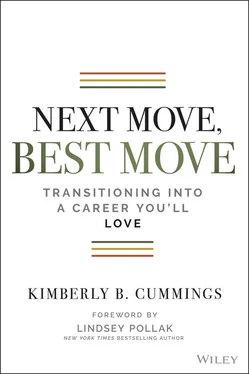Up until that point in my career, I had a steady stream of jobs to earn money. I was about two years out of college and determined not to go back to my hometown in Connecticut and live with my parents. Hell, it's a responsible decision to reduce the financial burden of living on your own while starting your career and preparing to pay for your student loans, but for me, I had built a life in New York and wasn't ready to return to my small hometown. I was raised in a town where I was one of a handful of underrepresented minorities in the school system and one of fewer than five Black families in the town. I considered moving home to be the ultimate failure because my 20‐year‐old mind didn't understand how I'd be able to return to New York at a later time, so my decisions were primarily based on how much money I was able to make to remain in New York and less about the work that I was doing.
So, in 2011, when I accepted the role of career development counselor, I knew I was ready to have a career and was excited about the work. Previously, I had a string of roles that were based on the convenience of location, the prospect of being happier, or the salary. I was not making strategic decisions about my career; I was simply stumbling into jobs. Again, these were jobs, not a career. The position I held before becoming a career development counselor sparked a deeper interest in building long‐term relationships with students, so working in career development was the answer for me. The work wasn't confined to a particular collegiate year; it spanned undergraduate to graduate and alumni in some institutions. Although the salary wasn't what I hoped for in that first role, I learned I would be eligible for a performance‐based increase at six months due to a new process to increase base salaries across the university. I may have walked into the office as if I was overly confident, but I didn't know a single thing about career counseling.
On my first day, I wore my I‐mean‐business outfit and interacted with everyone in a calm but cautious manner until I figured out who was who. I mentally prepared myself on how to walk into an office where I was finally building a career versus how I walked into just another job. When walking into just another job, the focus is generally on finding out your assignments, mastering them, and getting out of the office by 5 p.m. When the goal is to build a career, you bring curiosity to the table to understand your role and the organization's needs so you can contribute in a meaningful way outside of your day‐to‐day assignments.
Shortly after my first day, Amber and I were asked to share an office, and we quickly became close friends. We worked hard and became team leaders based on the appointments seen in any given month, innovative programs with departments outside of our office, and overall reviews from students. We knew career development wasn't just a job for us; it was a career.
Amber had started working at the institution eight months before me and straight out of her undergraduate program. I came in with a few years of professional experience unrelated to career development, so we ended up being on the same track together. Six months into the role, the policy to obtain a salary increase was no longer in effect. To this day, I have no idea why this policy stopped. I just remember hitting the six‐month mark and walking into my performance discussion feeling excited about recouping some of the money I sacrificed when I transitioned into higher education but being told that the money was no longer available. Knowing what I know now, I would have advocated for myself instead of walking away, but I didn't. Instead, I took this as a sign of workplace politics, and I let it pass.
Amber and I were promoted to senior career development counselors at the one‐year mark, based upon our performance, and we received a performance‐based salary increase. Given the norms in the office, these promotions and raises were common. If you performed well, you could expect to be promoted to a senior counselor within one year.
However, during my second year, things changed. During my first year, my goal was to learn the basics of career counseling, the office's norms, and lead the programming I was assigned. In the second year, we had metrics that were tracked and personal goals we needed to reach to move to the next level and ultimately be promoted to assistant directors. During the second year, the performance discussion with my supervisor changed how I thought about the world of work. I was in the early stages of this career path, but I was devoted and outperformed the other senior counselors in the office. I was also working on completing my master's degree in the evenings and required internships in the morning before work. At that time, I also didn't know very much about standing up for myself in the workplace, so when I disagreed with something, I'd vent to Amber, we'd grab a drink at one of our favorite restaurants after work, and I'd let it go.
By mid‐2013, when my second annual review came around, I expected another performance‐based salary increase and title change. I had surpassed all established goals, created innovative programs, presented at a state‐level conference, and joined the board for a professional organization. Maybe you can guess how this story unfolds.
I didn't get the full increase or title change.
My supervisor believed I could have exceeded my goals far past the level I reached.
To this day, I remember my exact feelings when I walked out of his office. My mind focused on one thought – I exceeded my goals for the year, but I could have exceeded them mor e. I tried to rationalize that thought but was overwhelmed with emotion. Then, more thoughts swirled around my mind.
Did he have a personal issue with me?
Could I have done more?
Was it a race thing?
Was it a gender thing?
Why was my standard of performance different from other senior counselors in the office?
I will never know the answers to those questions, but I will always remember the feeling of hopelessness. I felt like the only option I had was to accept the partial performance increase, sit down, and shut up. I was just getting into a groove in career development and did not have any mentors to contact. I also didn't have a clue about my professional brand and how I should promote myself to other universities if I wanted another job. All I knew was that I never wanted to feel like this again.
I vowed never to allow myself to be in that position again. I never wanted to feel like I had to accept something I disagreed with when it came to my ability to grow and excel. I also knew I needed to better understand how to articulate my feelings in the office and back them up with facts. That day I didn't receive the raise I wanted, but that moment certainly raised the stakes in pursuit of my own personal and professional development. As a result of my experiences, this book offers the specific tactics I learned, created, tested, and implemented to attain several dream jobs throughout my career (and even a few dream offers I turned down, too).
I want you to do more than read this book. I want you to beat up the pages – highlight passages, take notes, and reread chapters. Most of all, I want you to implement what you read. You can read all the lessons you want, and you can take notes of the advice I provide, but if you don't put action behind this advice, you are essentially holding yourself back from greatness, the greatness you and I both know you possess.
When I coach clients who are uninterested in changing their ways, I remind them that they are where they are because they keep doing the same mess that hasn't worked for them. This rebellious behavior comes in many forms – using the same, tired resume, attending networking events and not talking to anyone new, and submitting lots of job applications that never make their way to a hiring manager because they were using the wish‐and‐a‐prayer method versus truly advocating for themselves. If you are tired of doing the same things and not reaping results, it's time for you to let go of what you assumed was necessary to get a new job or position yourself as a leader and try something new, such as considering the methods I teach in this book (since you already invested in working with me by reading this introduction!).
Читать дальше












